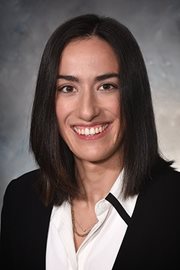Emily Kaplan

Emily is a medical student at the University of Virginia in Charlottesville interested in global health, infectious and cardiovascular diseases, and promoting equitable access to care. She has a BA in Global Affairs from Yale University. As a senior at Yale, she worked for the Global Fund to Fight AIDS, Tuberculosis (TB), and Malaria. After college, she worked as a management consultant, contributing to strategic healthcare initiatives for private sector companies, including an international COVID health and safety response. Her service activities and research in medical school have focused on identifying and mitigating health disparities locally and globally.
For her Kean fellowship, she will be working in Haydom, Tanzania, on a cost effectiveness analysis to evaluate noninvasive strategies for early detection of TB among children hospitalized with pneumonia or malnutrition. The findings of this project will inform future policy and practice in Tanzania as well as other low-income and developing countries with high burdens of TB. While in Haydom, she will also work on the general medicine wards and in the medical intensive care unit. Emily is currently applying to internal medicine residency programs and hopes to pursue a career in cardiovascular disease with a continued commitment to global health policy and practice. In her spare time, Emily enjoys running, traveling and reading historical fiction.

Stool testing for alternative rapid-diagnosis of TB: The START Study and
Clinical rotation in Haydom, Tanzania
Haydom Lutheran Hospital
Tanzania
What does the Kean Fellowship mean to you?
I am extremely grateful to receive the Kean fellowship. Though I have worked in the field of global public health in various settings—including a think tank, the WHO and UN through the Global Fund, and the private sector—I have never had the privilege of practicing medicine or contributing to health-related interventions on the ground in a developing country. I am eager to learn from mentors and colleagues who work in a different part of the world about the experiences, hopes and obstacles integral to healthcare practitioners and patients in resource-limited settings.
What do you anticipate learning?
I anticipate learning more about current tuberculosis and infectious disease diagnosis and care models in Tanzania. More broadly, I also expect to learn a great deal about different healthcare systems and barriers to healthcare access and delivery in resource-limited settings. Finally, I look forward to learning about the ethical implementation of research studies in low-income countries. Overall, I hope that this experience will not only provide me with valuable skills and knowledge for future global health work, but also enhance my cultural humility and understanding of diverse backgrounds and perspectives in my clinical work.
What interests you about tropical medicine and what problems are you interested in solving?
My interest in tropical medicine is rooted in combatting systems of injustice. Tropical areas are home to forty percent of the world's population, and infectious diseases stifle their economic growth and prosperity. Infectious diseases also do not respect borders. Dismissing burdens of disease abroad as problems "over there" not only ignores the intrinsic human dignity of those afflicted, but also is an international security risk, especially given our increasingly globalized world with continuing climate change and deforestation. I look forward to a career where I can draw on my international field work experience to promote health equity and strengthen health systems locally and globally.